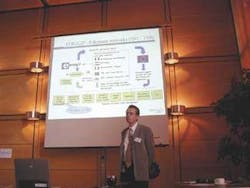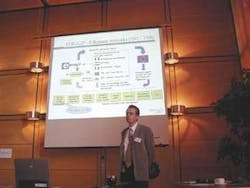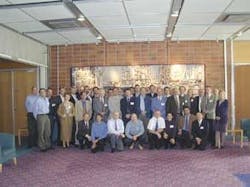Eurogif: Sustainable energy policy to accommodate socio-economic, technical concerns
Staale Selmer-Olsen
Det Norske Veritas
There is increased awareness that a joint effort is needed by the oil and gas industry's stakeholders to manage the whole capital provided by the industry to the best interests of future gener-ations. This includes energy, finance, techno-logy, knowledge, standards, experience, and skill, as well as facilities and infrastructure.
Today, companies aiming for sustainability need to perform not just against a single, financial bottom line, but against the triple bottom line of adding economic, environmental, and social value while balancing short-term and long-term priorities. This requires proper management of the integrated set of long-term risks facing the oil, gas, and energy business.
Among the networks initiated by Eurogif and the oil and gas industry, there was clearly a need for one addressing quality, health, safety and environment (QHSE). In 2000, Det Norske Veritas was appointed to coordinate TN1, or Trends – the Resource Network Facilitating QHSE Development for a Sus-tainable Energy Industry. Its current three-year program (2002-2005) has a budget of ¤4.4 million, of which ¤2.6 million is funded by the EC's Fifth Framework Program under two contracts, with the remainder funded by the partners.
The Trends network is bringing together organizations from across Europe to address the present and future challenges in the QHSE aspects of hydrocarbon energy production. The aim is to contribute substantially to meeting the present and future needs of a sustainable European energy supply, with high quality and safety standards and minimized environmental impacts. This is particularly relevant as oil and gas will remain major energy resources for Europe until alternative energy infrastructures are in place.
A sustainable energy supply throughout Europe requires extension from present production sites toward European continental margins and deepwater areas, securing reliable supplies from Russia and other non-European areas, as well as exploiting the harsh and vulnerable Arctic regions. In parallel, technologies, best practices, and knowledge need to be continuously improved and optimized, and also shared across geographic and company borders, to provide cost-effective energy while progressing toward more sustainable performance.
Achieving all this will require a major effort in innovation, transfer, and optimization of existing technologies, alongside matching legislation, policies, and regulations. Combined with the need to increase awareness of sustainability, re-usability, socio-economic value, and social responsibility, these related objectives can only be achieved by enhanced cooperation involving industrial partners and a range of organizations drawing on a sound technology and science base.
Trends is a dynamic network across which the number of partners will evolve over time. Presently, there are 65 contributing partners and observers from 13 states across Europe. Among the partners are oil companies like Agip, BP, Norsk Hydro, Shell, Statoil, and TFE; major suppliers such as ABB, Aker Kværner, Fugro, Schlumberger, and URS; R&D institutes such as IFP, Ifremer, Sintef, and TNO; universities such as Cranfield, Leiden, and Polimi; consultancy companies, class societies, regulators, NGOs, and small and medium enterprises.
The thematic network has 13 work comprehensive packages (WPs). Each WP includes research, technology, and development topics; strategy; socio-economic aspects; and an exploitation and dissemination plan. Four vertical WPs provide the knowledge and skill pool and supply the resources to the horizontal WPs. Vertical WPs operate as specialist thematic sub-networks. Seven horizontal WPs act as the delivery channels and run specific projects. One WP is responsible for result dissemination and for advice from the end-user. One WP is for management.
Deliverables include state-of-the-art reports on each technical area and an active web site for partners. Regular meetings of the partners will be held to disseminate good European practice in environmental protection, health and safety, quality, and reliability for the offshore industry. To stimulate change, the network will identify future RTD needs for QHSE and social responsibility development as a whole, as well as generating new ideas for the way forward. It will also produce viable input to European policies and standardization, and will contribute to scoping of future European RTD programs, i.e., initiatives under the Sixth Framework Program, as well as carrying out specific projects. It will share knowledge, norms, and ethics within Europe and with its supply regions and will contribute to the competitiveness of European industry.
The Trends network is being coordinated by DNV with Eurogif as the main co-contractor.
Recently, DNV hosted the first plenary meeting at its head office in Hovik, Norway. Seventy delegates attended from Trends member companies and the European Commission.
For more information, contact email: [email protected], or website: www.eurogif.org/trends.


